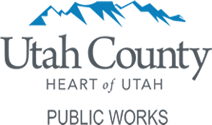Utah County Stormwater Coalition
Who we are:
A number of communities in Utah County have joined together to develop a stormwater management program to protect our waterways and enhance our quality of life. The goal of the Coalition is to utilize regional collaboration to identify existing resources and develop programs to reduce the negative impacts of stormwater pollution. The purpose of this web site is to enhance public knowledge and awareness of stormwater pollution and provide information to individuals and households to prevent stormwater pollution and protect water quality.
What is stormwater?
Stormwater is water from rain or melting snow that does not soak into the ground. It flows from rooftops, over paved areas, bare soil, and  sloped lawns. As it flows, stormwater runoff collects and transports soil, animal waste, salt, pesticides, fertilizers, oil and grease, debris and other potential pollutants.
sloped lawns. As it flows, stormwater runoff collects and transports soil, animal waste, salt, pesticides, fertilizers, oil and grease, debris and other potential pollutants.
What's the problem?
Rain and snowmelt wash pollutants from streets, construction sites, and land into storm sewers and ditches. Eventually, the storm sewers and ditches empty the polluted stormwater directly into streams and rivers with no treatment. This is known as stormwater pollution.
Polluted stormwater degrades our lakes, rivers, wetlands and other waterways. Nutrients such as phosphorus and nitrogen can cause the overgrowth of algae resulting in oxygen depletion in waterways. Toxic substances from motor vehicles, and careless application of pesticides and fertilizers threaten water quality and can kill fish and other aquatic life. Bacteria from animal wastes and improper connections to storm sewer systems can make lakes and waterways unsafe for wading, swimming and fish consumption. Eroded soil is a pollutant as well. It clouds the waterway and interferes with the habitat of fish and plant life.
Common Pollutants include:
Motor Oil
Yard clippings
Fertilizers and Pesticides
Soapy car wash water
Eroded sediment from construction projects
Litter
Animal waste
It's important to remember that any type of surface water runoff, not just rainfall, can run into the storm sewer and collect in the stormwater management system. For example, when you wash your car on the driveway, that water ends up in the system. That's why we need to be careful with what we put into the storm sewers as traces of all this material can end up in the stormwater system and our local waterways.
Links
|
|

